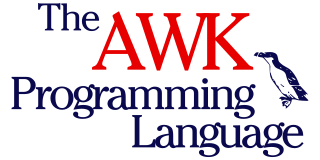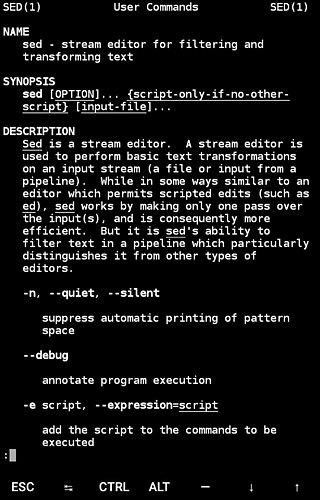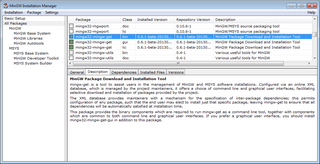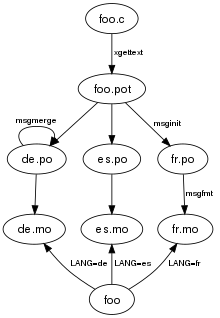
AWK is a domain-specific language designed for text processing and typically used as a data extraction and reporting tool. Like sed and grep, it is a filter, and is a standard feature of most Unix-like operating systems.
The Portable Operating System Interface is a family of standards specified by the IEEE Computer Society for maintaining compatibility between operating systems. POSIX defines both the system and user-level application programming interfaces (APIs), along with command line shells and utility interfaces, for software compatibility (portability) with variants of Unix and other operating systems. POSIX is also a trademark of the IEEE. POSIX is intended to be used by both application and system developers.

A shell script is a computer program designed to be run by a Unix shell, a command-line interpreter. The various dialects of shell scripts are considered to be scripting languages. Typical operations performed by shell scripts include file manipulation, program execution, and printing text. A script which sets up the environment, runs the program, and does any necessary cleanup or logging, is called a wrapper.

A man page is a form of software documentation usually found on a Unix or Unix-like operating system. Topics covered include computer programs, formal standards and conventions, and even abstract concepts. A user may invoke a man page by issuing the man command.

In computing, internationalization and localization (American) or internationalisation and localisation (British), often abbreviated i18n and l10n respectively, are means of adapting computer software to different languages, regional peculiarities and technical requirements of a target locale.
The C standard library or libc is the standard library for the C programming language, as specified in the ISO C standard. Starting from the original ANSI C standard, it was developed at the same time as the C library POSIX specification, which is a superset of it. Since ANSI C was adopted by the International Organization for Standardization, the C standard library is also called the ISO C library.

MinGW, formerly mingw32, is a free and open source software development environment to create Microsoft Windows applications.
The archiver, also known simply as ar, is a Unix utility that maintains groups of files as a single archive file. Today, ar is generally used only to create and update static library files that the link editor or linker uses and for generating .deb packages for the Debian family; it can be used to create archives for any purpose, but has been largely replaced by tar for purposes other than static libraries. An implementation of ar is included as one of the GNU Binutils.
printf is a C standard library function that formats text and writes it to standard output.
In computer programming, glob patterns specify sets of filenames with wildcard characters. For example, the Unix Bash shell command mv *.txttextfiles/ moves all files with names ending in .txt from the current directory to the directory textfiles. Here, * is a wildcard and *.txt is a glob pattern. The wildcard * stands for "any string of any length including empty, but excluding the path separator characters ".
xargs is a command on Unix and most Unix-like operating systems used to build and execute commands from standard input. It converts input from standard input into arguments to a command.
In computing, POSIX Threads, commonly known as pthreads, is an execution model that exists independently from a programming language, as well as a parallel execution model. It allows a program to control multiple different flows of work that overlap in time. Each flow of work is referred to as a thread, and creation and control over these flows is achieved by making calls to the POSIX Threads API. POSIX Threads is an API defined by the Institute of Electrical and Electronics Engineers (IEEE) standard POSIX.1c, Threads extensions .

tr is a command in Unix, Plan 9, Inferno, and Unix-like operating systems. It is an abbreviation of translate or transliterate, indicating its operation of replacing or removing specific characters in its input data set.
In computing, echo is a command that outputs the strings that are passed to it as arguments. It is a command available in various operating system shells and typically used in shell scripts and batch files to output status text to the screen or a computer file, or as a source part of a pipeline.
In computing, tee is a command in command-line interpreters (shells) using standard streams which reads standard input and writes it to both standard output and one or more files, effectively duplicating its input. It is primarily used in conjunction with pipes and filters. The command is named after the T-splitter used in plumbing.
The Translate Toolkit is a localization and translation toolkit. It provides a set of tools for working with localization file formats and files that might need localization. The toolkit also provides an API on which to develop other localization tools.

Gtranslator is a specialized computer-assisted translation software and po file editor for the internationalization and localization (i18n) of software that uses the gettext system. It handles all forms of gettext po files and includes features such as Find/Replace, Translation Memory, different Translator Profiles, Messages Table, Easy Navigation and Editing of translation messages and comments of the translation where accurate. Gtranslator includes also a plugin system with plugins such as Alternate Language, Insert Tags, Open Tran, Integration with Subversion, and Source Code Viewer. Gtranslator is written in the programming language C for the GNOME desktop environment. It is available as free software under the terms of the GNU General Public License (GPL).
Getopt is a C library function used to parse command-line options of the Unix/POSIX style. It is a part of the POSIX specification, and is universal to Unix-like systems. It is also the name of a Unix program for parsing command line arguments in shell scripts.

In Unix and Unix-like operating systems, printf is a shell builtin that formats and outputs text like the same-named C function.







